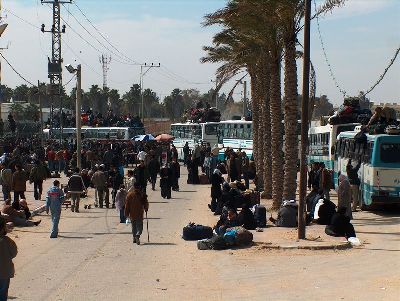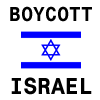1090 Days to the Israeli Blockade of Gaza:
Somebody tell O’Bummer!
Help to stop the next war! Support Boycott, Divestment and Sanctions of the Israeli regime
Support Palestinian universities – spread the BDS campaign – it is what people under the Israeli jackboot ask you to do
An army fighting against children has already lost the war!
Israeli War Criminals – to the International Criminal Court, NOW!
Make Zionism History!
One year since the Gaza Carnage by Israel’s murderers! We shall
not forget!
Demand the destruction of Israeli WMDs NOW!
Gaza Border Opened after 72 days: The Only Democracy?
May 21st, 2010, by Jesse Bacon
Amid rumors of tension between the Hamas government and Egypt, on Saturday, May 15, 2010, the Rafah border crossing between Gaza and Egypt was opened to the passage of people wishing to enter and exit the Gaza Strip. The border had been closed for 72 days prior to this latest opening.

The border crossing, which is due to be open for just a few days, has been closed on a regular basis since June 2007, except for occasional and limited openings that meet only 6% of the travel needs of the residents of the Gaza Strip.
Thus, during the present opening (only the third since the beginning of 2010), 8,000 people managed to submit applications for travel permits to the Interior Ministry in Gaza (a prerequisite for exit). With no knowledge of when the border would reopen, and based on the assessment that no more than 8,000 people would get through the border this time, the Interior Ministry has closed the registration process to further applications.
Initial figures show that on the first two days of opening (Saturday and Sunday) fewer than 2,000 people managed to cross over to the Egyptian side, while about 250 who entered the crossing were returned to the Gaza Strip by Egyptian forces for unknown reasons. About 300 people managed to enter Gaza from Egypt.
In comparison, before the closure, 40,000 people passed into and out of Gaza through the Rafah border crossing every month in order to realize their right to freedom of movement and access medical treatment, work, educational opportunities, and family.
Hariri: International community must take responsibility for Middle East peace: Haaretz
Ahead of Washington trip, Lebanese PM urges world powers to make ‘serious effort’ to push forward Israel-Palestinian talks – but Obama administration is more likely to focus on flow of arms to Hezbollah.
Ahead of a trip to Washington, Lebanese Prime Minister Said Hariri called on the international community to step up pressure on Israel and the Palestinians to strike a peace deal.
Hariri met with Egyptian President Hosny Mubarak Saturday in Cairo to discuss the mid-east peace process and regional developments.
The two leaders talked about ways to revive the indirect peace talks between the Palestinians and Israel as well as developments inside Lebanon.
After the meeting, Hariri said that it was time for the “international community to take responsibility” and exert “serious efforts” to push the peace process forward, Lebanese TV channel al-Mustaqbal reported.
“The only end for this process is peace,” Hairi said, adding that he would convey this message to US President Barack Obama, al-Mustaqbal added.
Hariri arrived earlier for his short visit which is part of an Arab tour ahead of his visit to the United States, which included Syria, Jordan and Saudi Arabia.
He is scheduled to meet Obama on Monday amid fears of renewed fighting between Lebanon and Israel.
Later on Saturday, he is due to head for Istanbul to meet Turkish Prime Minister Recep Tayyip Erdogan and Foreign Minister Ahmet Davutoglu.
U.S. President Barack Obama is likely to raise concerns about Syria arming Hezbollah guerrillas in Lebanon when he meetsHariri on Monday, a U.S. official said on Friday.
White House spokesman Robert Gibbs said the two leaders would discuss a “broad range of mutual goals in support of Lebanon’s sovereignty and independence, regional peace and security”.
Hariri’s first official visit to the United States takes place against a backdrop of tensions in the Middle East, U.S. efforts to restart Israeli-Palestinian peace talks and growing momentum toward new international sanctions on Iran.
Analysts expect Obama to be more encouraging in tone than demanding of results when he meets Hariri, who heads a national unity government that includes Hezbollah – a Shi’ite Islamist guerrilla group which is backed by Syria and Iran and is listed as a terrorist organization by the United States.
Lebanon and Syria have said they fear a possible attack by Israel after President Shimon Peres accused Syria in April of supplying Hezbollah with long-range Scud missiles capable of hitting Israel. Damascus has denied the charge and accused Israel of fomenting war.
Some U.S. officials have expressed doubt that any Scuds were actually handed over in full to Hezbollah, although they believe Syria might have transferred weapons parts.
“We obviously have grave concerns about the transfer of any missile capability to Hezbollah through Lebanon from Syria,” a senior Obama administration official told Reuters, saying the issue would likely be raised in Monday’s talks.
Another official said Washington would ask Hariri to continue to support efforts “toward comprehensive regional peace.”
Hariri has also denied Israel’s accusations, while his government has said it backs the right of the guerrilla group to keep its weapons to deter Israeli attacks. Israel, which fought a 34-day war with Hezbollah in 2006, has not signaled any imminent plans to strike.
The war of words heightened tensions in the region, but the UN Special Coordinator for Lebanon, Michael Williams, noted on Friday “that recent tension is now diminishing.”
Williams, who held talks with Hariri in Beirut, was quoted by the prime minister’s office as saying he was pleased “that all sides have scaled back the rhetoric.”
Obama and Hariri are also expected to discuss U.S.-led international efforts to isolate Iran over its disputed nuclear program, officials said. Lebanon holds the rotating presidency of the UN Security Council through May 31.
Diplomats said Beirut had quietly asked the permanent members of the Security Council – Britain, France, Russia, China and the United States – not to push for a vote on a new Iran sanctions resolution while it held the presidency.
Lebanon is expected to abstain in any vote because Iranian-backed Hezbollah is in its government, diplomats said.
Jon Alterman, a Middle East expert at the Center for Strategic and International Studies in Washington, said Lebanon no longer enjoyed the status it had under the Bush administration, when it was the “fulcrum” of efforts to spread democracy in the Middle East.
The Obama administration’s Middle East policy is more focused on the nuclear stand-off with Iran, war in Afghanistan, and reviving the Middle East peace process, he said.
Nevertheless, the United States has expanded military assistance to Lebanon to strengthen its armed forces as a counterweight to Hezbollah, allocating $500 million to training and equipping Lebanese security forces since 2005.
Second Mid-East talks end with no sign of progress: BBC
No date has been set for a further rounds of proximity talks
Middle East envoy George Mitchell wound up a second round of indirect peace talks between Palestinians and Israeli without any outward sign of progress.
A statement from the office of the Israeli PM Benjamin Netanyahu spoke of the “possibility” of goodwill gestures towards the Palestinians. No details were given.
The US envoy and Mr Netanyahu met for three and a half hours on Thursday. Mr Mitchell met Palestinian leader Mahmoud Abbas earlier in the week.
The indirect, proximity talks are set to continue for four months, and should get to addressing some of the core issues – borders, Jerusalem, and refugees.
All parties say they hope these will lead to direct negotiations.
Shuttle diplomacy
In the current talks Mr Mitchell shuttles between Mr Netanyahu’s office in Jerusalem and Mr Abbas’ office in Ramallah, a journey of about 10 miles (15km).
Thursday’s statement from Mr Netanyahu’s office said part of the meeting with Mr Mitchell concentrated on water issues.
The US envoy met Mr Abbas on Wednesday. He was given letters protesting against the killing of a Palestinian teenager in the West Bank, allegedly by an Israeli settler, and the killing of an elderly farmer in Gaza by the Israeli military.
Palestinian chief negotiator Saeb Erekat said his side also brought up the “the numerous Israeli provocative statements of the last few days”.
Palestinian officials have been angered by repeated statements by Israeli officials, including the prime minister, that settlement construction would continue in occupied East Jerusalem.
‘Giving cover’
The Palestinian Islamist group, Hamas, which controls the Gaza Strip, has criticised the talks, warning that they “give cover to the Israeli occupation to commit more crimes against our people”.
The proximity talks were meant to start in March, but Palestinians pulled out of talks after Israeli municipal authorities approved plans for 1,600 new homes in the East Jerusalem settlement of Ramat Shlomo.
The announcement was made during a visit to Israel by US Vice-President Joe Biden and caused great strain in Israeli-US relations.
The Palestinian Authority’s formal position is that it will not enter direct talks unless Israel completely halts building in the West Bank and East Jerusalem.
In November, Israel announced a 10-month suspension of new building in the West Bank, under intense US pressure.
But it considers areas within the Jerusalem municipality as its territory and thus not subject to the restrictions.
Israel has occupied the West Bank, including East Jerusalem, since 1967. It insists Jerusalem will remain its undivided capital, although Palestinians want to establish their capital in the east of the city, and the international community does not recognise the Israeli annexation of the east of the city.
Nearly half a million Jews live in more than 100 settlements in the West Bank, among a Palestinian population of about 2.5 million.
The settlements are illegal under international law, although Israel disputes this.
Hezbollah shows off weaponry in Lebanon ‘tourist complex’: YNet
Shiite group inaugurates museum to mark 10th anniversary of Israeli pullout from south Lebanon. Organization’s chief, Hassan Nasrallah says in televised speech, ‘Armies that emerge victorious from wars display their exploits’
The Hezbollah Shiite organization on Friday inaugurated a “tourist complex” displaying its own heavy weapons and those left by Israel, to mark the 10th anniversary of Israel’s pullout from south Lebanon.
“Armies that emerge victorious from wars display their exploits in museums,” Hezbollah chief Hassan Nasrallah said in an inaugural speech broadcast live at the complex on a giant television screen. He was not present in person.
This site “is a modest initiative compared… to the sacrifices and historic victories that have been gained,” Nasrallah said of the 2006 war in which Israel failed to crush Hezbollah, or the “party of God” in Arabic.
“One of our principal responsibilities is to preserve the history of resistance… and this museum is built on the ground of resistance,” Nasrallah told hundreds of people gathered in a courtyard at the complex.
The site, located in the sprawling southern locality of Mlita, was a Hezbollah military base during Israel’s 1978-1990 occupation of south Lebanon and the 2006 war.
The museum will open to the public from May 25, the anniversary of the Israeli pullout, which is this year being marked as a national holiday.
Hezbollah has also been organising “jihadist tours,” in which 500 young men and women were taken on a field trip to witness what the Iran-backed group called the “achievements of the resistance” against Israel.
Dozens of anti-tank and Katyusha rockets, Iran-built “Raad 1” missiles, mortars and rocket launchers are on display in the complex that encompasses a mountain cave, wooded grounds and a newly built gallery.
Israeli Merkava tanks are also on display.
Several Hezbollah fighters were killed in Israeli raids while digging the caves to hide weapons, according to guide Mohammad Sayyed.
The museum is the first complex of its kind in the world, Hezbollah said in a statement.
